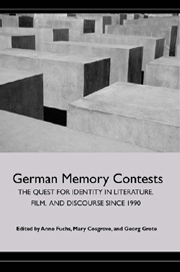Book contents
- Frontmatter
- Contents
- Acknowledgments
- Introduction: Germany's Memory Contests and the Management of the Past
- Positions
- Mediations
- 4 Being Translated: Exile, Childhood, and Multilingualism in G.-A. Goldschmidt and W. G. Sebald
- 5 “Ein Stück langweiliger als die Wehrmachtsausstellung, aber dafür reprüsentativer”: The Exhibition Fotofeldpost as Riposte to the “Wehrmacht Exhibition”
- 6 German Crossroads: Visions of the Past in German Cinema after Reunification
- 7 Monika Maron's Pawels Briefe: Photography, Narrative, and the Claims of Postmemory
- Ethnicity/Hybridity
- Memory Politics
- Works Cited
- Notes on the Editors and Contributors
- Index
6 - German Crossroads: Visions of the Past in German Cinema after Reunification
from Mediations
Published online by Cambridge University Press: 05 February 2013
- Frontmatter
- Contents
- Acknowledgments
- Introduction: Germany's Memory Contests and the Management of the Past
- Positions
- Mediations
- 4 Being Translated: Exile, Childhood, and Multilingualism in G.-A. Goldschmidt and W. G. Sebald
- 5 “Ein Stück langweiliger als die Wehrmachtsausstellung, aber dafür reprüsentativer”: The Exhibition Fotofeldpost as Riposte to the “Wehrmacht Exhibition”
- 6 German Crossroads: Visions of the Past in German Cinema after Reunification
- 7 Monika Maron's Pawels Briefe: Photography, Narrative, and the Claims of Postmemory
- Ethnicity/Hybridity
- Memory Politics
- Works Cited
- Notes on the Editors and Contributors
- Index
Summary
Der Strom der Geschichte floß. Zuweilen trat der Strom über die Ufer. Er überschwemmte das Land mit Geschichte.
— Wolfgang Koeppen, Tauben im Gras[The stream of history was flowing. Now and then, it burst its banks and flooded the country with history.]
If one substitutes the term “memory” for “history” in the above quotation from Wolfgang Koeppen's 1951 novel Tauben im Gras (Pigeons in the Grass), an accurate description of the intellectual atmosphere in postunification Germany emerges. For at least two decades now almost every public utterance about the Third Reich — political, cultural, or artistic — has ignited fierce and passionate memory contests. The inaugural ceremony of the Neue Wache in Berlin, Martin Walser's speech in the Frankfurter Paulskirche, the erection of a Holocaust memorial in Berlin, the Crimes of the Wehrmacht exhibition, all these are examples of the ferocity of public memory contests. Additionally, publications by Daniel Goldhagen, Jörg Friedrich, and most recently Götz Aly, as well as renegotiations of the National Socialist past in German literature (most recently in the form of autobiographical and family narratives) show that Germany is flooded by a constant stream of contentious memory texts, and that this proliferation has found its echo in the academic world.
Interesting to note, however, is the fact that the abundance of German films about the Third Reich made since 1990 has been all but ignored by academic critics.
- Type
- Chapter
- Information
- German Memory ContestsThe Quest for Identity in Literature, Film, and Discourse since 1990, pp. 127 - 146Publisher: Boydell & BrewerPrint publication year: 2006



